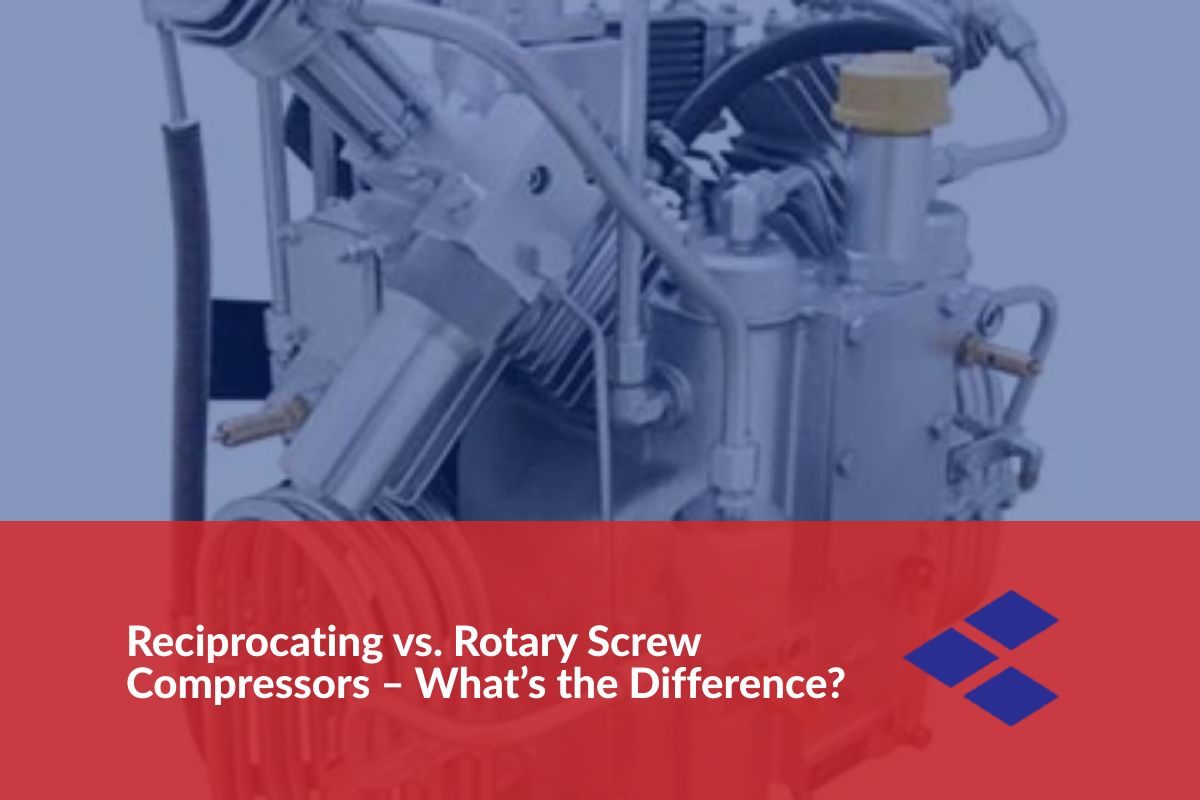
Before purchasing an air compressor, it’s best to carefully consider your options. You may also want to research the type of compressor that is best for your specific application. While researching, you’ll likely come across articles mentioning both reciprocating air compressors and rotary screw air compressors. But how do these machines work, and what is the difference between the two types?
How Does a Reciprocating Air Compressor Work?
Reciprocating air compressors are also known as piston air compressors. The compressors utilize pistons driven by a crankshaft to compress air. The compressed air is then stored in a receiver reservoir or tank, ready to be used in industrial applications. Pistons have been utilized for air compression for many years, and the technology remains a reliable way to create and maintain compressed air for industrial applications.
Reciprocating air compressors are available for a lower up-front cost than their rotary screw counterparts, as they use less advanced technology. While these machines can be fairly noisy, more advanced models often come with noise reduction features to limit the air compressor’s sound.
Reciprocating air compressors are designed to operate at high pressures and are, therefore, suited to industrial applications that require high-pressure air. However, while ideal for high-pressure situations, because of the constant movement of pistons within the system, the airflow produced can cause pulsations or fluctuations in the airflow produced by the system.
How Does a Rotary Screw Air Compressor Work?
Rotary screw compressors use multiple meshing helical screws, which are known as rotors. These rotors compress air within the system by turning and pushing air through the compressor into smaller and smaller chambers. These systems continuously produce compressed air as the rotors turn. Like most compressors, the compressed air travels to a tank where it is stored. While this form of air compressor system has been around for many years, technological advances have improved both the durability and efficiency of these machines.
This type of air compressor system is more efficient when compared to reciprocating air compressors, and they provide systems with a more continuous amount of compressed air and a lower energy cost. Another benefit of rotary screw compressors is their quiet operation. Reciprocating air compressors tend to be quite loud because of the pistons housed inside the system.
Rotary screw compressors are also able to produce a steady and consistent air stream, as the rotors in the machine compress the air at a constant rate. These air compressors work best at lower pressures, making them best suited for systems requiring lower-pressure air, like the operation of pneumatic tools.
Rotary screw air compressors are bulkier and larger in comparison to their reciprocating counterparts. They tend to take up additional floor space because they are dealing with a larger amount of air.
Which is Better: Reciprocating Compressors or Rotary Screw Compressors?
While these two types of compressors may seem somewhat similar, their differences make them better suited for different applications. Therefore, finding the right type of compressor for your system should be relatively simple, given you know the requirements of your industrial application. Rotary screw compressors are designed for systems that require a smooth, steady flow of air at a lower pressure. Common industrial applications for rotary screw compressors include manufacturing, food and beverage, oil and gas, and automotive systems. Reciprocating air compressors are meant for applications that need high-pressure air or air produced at a low flow rate, like construction, some automotive, and HVAC applications.
Why Choose ESA?
Here are a few of the top reasons our customers keep coming back to ESA for all their industrial air compressor needs:
- Dedicated to customer satisfaction: At ESA, our customers mean a lot to us. We want to provide them with the best parts and services possible. We work closely with our clients, helping to determine the correct system and parts requirements for their industry and ensuring those systems are installed correctly. We also help with any maintenance your system may require throughout its lifetime.
- Decades of experience: We only hire the best at ESA. Our experts have decades of experience in air compressor installation and maintenance. They can clearly determine our clients’ needs and strive to meet them through routine service, repair, and replacement installation.
- We want to save you money: We know installing and maintaining an air compressor is rarely cheap. That’s why we do our best to save our customers money along the way.
If you or someone you know needs assistance when it comes to finding the right air compressor, maintaining an air compressor, or replacing parts on an air compressor, call us today at ESA for a consultation.
Arthur Pue
Arthur Pue is the President of Engineering Sales Associates. Connect with him on LinkedIn.
